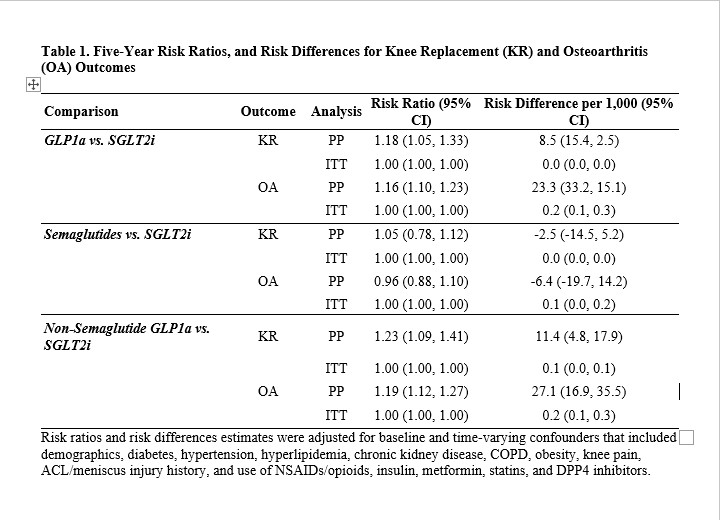Session Information
Session Type: Poster Session A
Session Time: 10:30AM-12:30PM
Background/Purpose: Anti-diabetic medications often have effects on other conditions. GLP1 agonists (GLP1a) have shown protective effects on OA outcomes in trials and short-term trial emulations, but many patients stop treatment and long-term outcomes are unknown. To assess the effectiveness of GLP1a accounting for treatment discontinuation or switching, we selected SGLT2 inhibitors (SGLT2i) as an active comparator, which have pleiotropic effects and are efficacious in several diseases. We compared the effectiveness of GLP1a vs. SGLT2i on the 5-year risk of knee replacement (KR) and OA, using per-protocol analyses to account for treatment discontinuation or switching, addressing limitations of prior intention-to-treat (ITT) analyses that assumed sustained treatment and ignored time-varying confounding.
Methods: We emulated a target trial using 2015–2022 Merative MarketScan Commercial Claims data, including persons aged 45-65 initiating GLP1a or SGLT2i GLP1a with at least 1 year of continuous enrollment and a washout period (with no prior use of either drug). Exclusions included a prior diagnosis of fibromyalgia, rheumatoid arthritis, or any claims for KR (the primary outcome) or OA (the secondary outcome) before drug initiation. Baseline and time-varying confounders included in the model are shown in the Table 1. We used parametric g-formula for per-protocol analyses, modeling time-varying hazards with pooled logistic regression to estimate cumulative risks of treatment with GLP1a SGLT2i vs. SGLT2i. GLP1a, accounting for censoring due to discontinuation, switching, loss to follow-up, or study end (5 years). Of GLP1a, because semaglutides cause greater weight loss than earlier GLP1a, they may be uniquely beneficial in OA. Thus, we carried out sensitivity analyses to assess 5-year outcome risk comparing semaglutides vs. SGLT2i and non-semaglutide GLP1a drugs vs. SGLT2i. We further carried out ITT analyses to highlight the impact of non-adherence on risk estimates.
Results: Among 323,445 eligible individuals (129,603 GLP1a initiators and 193,842 SGLT2i initiators, mean age 55, 49% male, 61% with diabetes [72% GLP1a, 53% SGLT2i]), per-protocol analyses showed that 5-year risk of KR was 18% greater in GLP1a users vs. SGLT2i users (Table 1; risk ratio = 1.18, risk difference: 8.5 more KR cases per 1,000 in GLP1a initiators). For OA, GLP1a users had a 16% greater risk (Table 1: risk ratio = 1.16; risk difference: 23.3 more OA cases per 1,000 in GLP1a initiators). In contrast, sensitivity analyses showed no significant KR or OA risk differences for semaglutides vs. SGLT2i, whereas non-semaglutatides vs. SGLT2i showed reduced risks in SGLT2i users (Table 1). ITT analyses, ignoring drug discontinuation or switching, showed no significant differences for either outcome (Table 1).
Conclusion: GLP1a’s increased risk of KR and OA onset compared with SGLT2i, suggesting SGLT2i may have previously unrecognized therapeutic effects in OA. Semaglutides and SGLT2i showed similar effects on KR and OA despite semaglutide’s well-recognized weight loss effects. Our results also suggest that ITT analyses may not accurately reflect long term risks of drugs on OA outcomes, especially for drugs where discontinuation or switching is common.
 Table 1. Five-Year Risk Ratios, and Risk Differences for Knee Replacement (KR) and Osteoarthritis (OA) Outcomes
Table 1. Five-Year Risk Ratios, and Risk Differences for Knee Replacement (KR) and Osteoarthritis (OA) Outcomes
To cite this abstract in AMA style:
Ukonu N, Felson D, LaValley M, Jafarzadeh S. Per-Protocol Analysis of the Effectiveness of GLP1 Agonists Against SGLT2 Inhibitors on Osteoarthritis Outcomes [abstract]. Arthritis Rheumatol. 2025; 77 (suppl 9). https://acrabstracts.org/abstract/per-protocol-analysis-of-the-effectiveness-of-glp1-agonists-against-sglt2-inhibitors-on-osteoarthritis-outcomes/. Accessed .« Back to ACR Convergence 2025
ACR Meeting Abstracts - https://acrabstracts.org/abstract/per-protocol-analysis-of-the-effectiveness-of-glp1-agonists-against-sglt2-inhibitors-on-osteoarthritis-outcomes/
